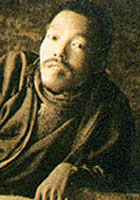Masaoki Shiki
Masaoki Shiki Poems
the bucket's water
poured out and gone,
drop by drop
dew drips like pearls
...
In the spring chill,
as I slept with sword by pillow,
deep at night
my little sister came to me
...
saw the country
and returned—now deep at night
I lie in bed and
fields of mustard flowers
...
the plaintain at the veranda's edge
unfolds its coiled leaves,
its jewels,
and veils the water basin
...
to every needle
of the needled pine it clings—
the pearl white dew,
forming but to scatter,
...
Masaoki Shiki Biography
Shiki was born in Matsuyama on September 17, 1867 to Tsunenao, a low ranking samurai and Yae the daughter of Oharo Kanzan, a teacher at the feudal clan school. His real name was Tsunenori, but he was called Noboru as a child. Shiki, lost his father at the age of five and Kanzan took over his education and educated him in the Chinese Classics. He was very strict and conservative. Shiki was also influenced by his uncle , Kato Takusen, who later served as a diplomat and the mayor of Matsuyama. Shiki was inspired by the Freedom and People's Right Movement, and in 1883 he went to Tokyo to become a politician, but while studying at the Imperial University, his interest in politics and philosophy gave way to a growing fascination with literature. He began writing fiction, but he gradually concentrated on the study and composition of haiku. When he was twenty-two, he began coughing up blood and adopted the pen name Shiki, the name of a bird that, according to legend, coughs blood as it sings. He decided to devote himself to literature, withdrew from the university, and began working for the newspaper Nippon. Shiki called for the reform of haiku and tanka, very brief forms of traditional poetry of seventeen and thirty-one syllables, respectively. Haiku, in particular, focus on nature and or simple occurrences of daily life, but the condensation required by the form can result in great expansiveness and depth. The traditional forms, however, had grown trite and formulaic over the years. Shiki recommended composition based on Shasei, or sketch from life, and interjected this principle of describing life just as it is into his prose writing, as well as his haiku and tanka. Until two days before his death, Shiki continued writing articles, including a series under the title Byo-sho Rokusyaku (A Six feet Sickbed), in spite of intense suffering from the spinal caries that had afflicted him since 1895. He died on September 19,1902. During his brief life, Shiki attracted a number of followers, who were influenced by and carried on his sketch-from-life theory of literature. Through them, as well as in his own right, he left his mark on the history of modern Japanese literature.)
The Best Poem Of Masaoki Shiki
Haiku 01
In the coolness
of the empty sixth-month sky...
the cuckoo's cry.
Masaoki Shiki Comments
for PH: don't you think that this page should be erased..?
it's MasaokA Shiki go to the correct page (MASAOKA SHIKI) for much more poems

In his last years, writing and eating fruit were the only pleasures in his sick bed. He was tortured by pain, but when morphine could mask the main, he enjoyed painting, too. While the death was closing to Shiki, he composed a haiku on a cicada. a late summer cicada at the top of his voice chirping, and chirping....... The image of the life of the cicada overlaps his fate close to death.